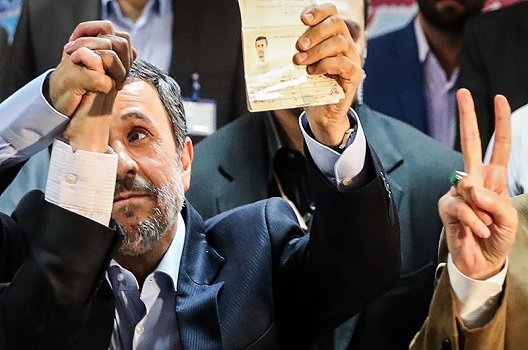 The former president of Iran, Mahmoud Ahmadinejad, is again in the forefront of Iranian social media.
The former president of Iran, Mahmoud Ahmadinejad, is again in the forefront of Iranian social media.
An egomaniac who cannot bare to fall out of media attention, Ahmadinejad has lately declared war on the Iranian judiciary, which has brought court cases against his top presidential aides, Esfandiyar Rahim Mashaei and Hamid Baghaei, on charges of corruption and misuse of public funds.
In a recent letter to the Supreme Leader, Ayatollah Ali Khamenei, Ahmadinejad criticized the government, claiming that judiciary officials are letting their personal beliefs and judgments affect their work and that this is hurting the Iranian people. The letter was a follow up to a recent interview in which he referred to the ‘Dictatorship of the Justice System’.
Such tactics shouldn’t be a surprise to anyone, since in the debates during the 2009 election campaign, Ahmadinejad boasted about how he was going to tackle corruption in his second term. He claimed to have the names of corrupt people in his pocket, but they never came out. Instead, the people of Iran witnessed more widespread corruption and suffered under unprecedented nuclear-related sanctions that the president cavalierly dismissed as a “scrap of paper.”
Indeed, it came to be seen that Ahmadinejad had a list of corrupt people in his pocket, but that they came out of his own address book. Record-breaking corruption and embezzlement cases were brought during his tenure. He also welcomed a criminal, Saeed Mortazavi, to his government after Mortazavi was expelled from the judiciary due to the deaths of detainees at the notorious Kahrizak detention center during massive protests that followed the fraud-marred 2009 elections. (Mortazavi was recently sentenced to two years in prison in connection with the death of one of the detainees.)
What is happening now in Iran with Ahmadinejad is thus a re-run of an old story. The former president has long despised a prominent Iranian family, the Larijanis, whose members occupy top posts including head of the judiciary and speaker of parliament. The former president sees accusations of corruption as potential get-out of jail tokens to use when one his brethren is prosecuted for wrongdoing.
He has inveighed against the late Iranian president Hashemi Rafsanjani and a former parliament speaker, Ali Akhbar Nategh-Nouri. In 2013, Ahmadinejad played a recording to astonished members of parliament that supposedly proved corruption by Fazel Larijani, the brother of parliament speaker Ali Larijani and judiciary chief Sadegh Larijani. This was a failed attempt to prevent parliament from dismissing one of Ahmadinejad’s ministers over his decision to give a new job to the disgraced Mortazavi.
It is doubtful that Ahmadinejad’s latest efforts will prove more successful. While Iranians are deeply aware of the corruption that taints their government and society, memories are still fresh of the shoddy Ahmadinejad housing projects that crumbled during a recent earthquake in Iran’s Kurdish region.
Ahmadinejad already committed political suicide when he insisted on trying to run for a third term in the 2017 presidential elections even though the Supreme Leader advised him against it. The firebrand populist, who long ago lost legitimacy among the regime’s officials, has now lost most of his base by showing that when it comes to fighting corruption, he is acting for his own gain and that of his cronies.
While in power, people such as Mortazavi were Ahmadinejad’s closest friends and prosecuted journalists and other critics to limit freedom of speech. Only now that the system has turned on Ahmadinejad are these officials suddenly all bad.
Although he probably has a vast amount of information on important people inside Iran, obtained during his last days as president from Intelligence Ministry files, Ahmadinejad is not likely to reoccupy a seat of power.
No one knew Ahmadinejad better than Mirhossein Mousavi, his chief rival in the 2009 election, and the calamities Ahmadinejad brought to Iran. Unfortunately, Mousavi has been under house arrest since 2011 while Ahmadinejad still roams the streets of Iran freely. It is easy to see who is honest and who is a liar.
Sirous Amerian is a PhD Candidate and tutor at the Centre for Defence and Security Studies, Massey University in New Zealand. He received his MA in Indian Studies from the University of Tehran working on Sino-Indian-American trilateral relations. While in Iran, he worked as a Policy Analyst for the Institute of Iran Eurasian Studies (IRAS). He tweets at https://twitter.com/AmerianS
Image: Former Iranian President Mahmoud Ahmadinejad (Tasnim News Agency)
